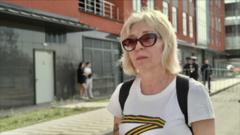In anticipation of Victory Day, Russians commemorate the Soviet triumph over Nazi Germany amidst ongoing tensions with Ukraine. While celebrating their past, many grapple with the realities of war and conflicting narratives surrounding national identity and aggression.
Commemorating Victory Day: Russia's Dual Legacy of War and Memory

Commemorating Victory Day: Russia's Dual Legacy of War and Memory
As Russia marks the 80th anniversary of its World War II victory, historical re-enactments blend with current conflicts, highlighting a complex narrative.
Eighty miles from Moscow, a park vibrates with the sounds of battle simulations as hordes of actors reenact one of the final confrontations of World War II—a spectacle that captures the 80th anniversary of the Soviet victory against Nazi Germany. Spectators gather on the shore, eyes riveted on the depiction of Soviet forces commandeering a bridge, raising the hammer and sickle over the swastika they have just removed. Dubna, where this dramatic commentary unfolds, is merely one venue showcasing Russia's reverence for what it terms The Great Victory.
Among the onlookers is Katya, who recounts her family's wartime history; her grandfather vanished in the final days of the fighting in Berlin, only to be later confirmed dead. Today, her son participates in a very different conflict, volunteering to fight in Ukraine—"the special military operation," as the Kremlin would prefer it be termed. Her narrative intertwines generations of sacrifice, echoing the stories of many Russian families.
Remembering the harrowing toll of war, officials remind citizens of the cost. The USSR lost upwards of 27 million during the Great Patriotic War, a staggering statistic that underscores the emotional weight this legacy carries. However, the narrative takes a sharp twist; the recent invasion of Ukraine is framed as a continuation of this struggle, with Russian authorities positioning themselves as liberators against a resurgence of fascism.
"The past haunts the present," observes Andrei Kolesnikov, a columnist. "Victory in the Great Patriotic War forms an enduring narrative of unity for Russia." Now, authorities paint today's events as a direct consequence of the ongoing fight against perceived Euro-fascism, embedding a historical framework into the contemporary conflict. Compelling symbols reinforce this. A juxtaposition monument in Khimki features a Soviet soldier alongside one from the current engagement, portraying a continuity of resistance.
As the nation gears up for the grandeur of Victory Day parades, ornate decorations proliferate—from themed trains in the metro to newborns at a Siberian hospital outfitted in military regalia. The streets teem with proclamations of pride, reminding citizens of their historical endeavors. Tanks roll through Moscow, and the atmosphere is akin to a unifying ritual, underscoring not just remembrance but also a manifestation of national sovereignty under President Putin’s rule.
As the commemorative events lead up to the main day, international scrutiny intensifies. With the backdrop of a protracted war in Ukraine and recent drone threats to Moscow, questions loom regarding Russia’s present plight—that military operations, once thought temporary, have morphed into a lengthy ordeal with heavy casualties.
While National Days typically embrace patriotism, they also kindle bittersweet reflections among elder generations. Fyodor Melnikov, a 98-year-old veteran whose brother perished in the Great Patriotic War, contemplates the true impact of conflict. He recites a poignant poem, a personal relic of loss, encapsulating his enduring hope that life should thrive beyond the past.
On Victory Day, the Russian population will come together not only to celebrate a hard-won success but also to reflect on the profound costs intertwined with conflict.

















